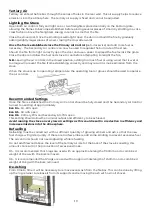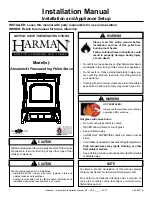
6
Metal Parts
When installing or servicing this stove, care should be taken to avoid the possibility of personal injury.
Modification
No unauthorised modification of this appliance should be carried out.
Safety
WARNING
–
This appliance will be hot when in operation and due care should be taken. The supplied
operating tool or glove may be used to open the door and operate the air controls.
Aerosols
Do not use an aerosol spray on or near the stove when it is alight.
Fireguards
Always use a fireguard in the presence of children, the elderly or the infirm. The fireguard should be
manufactured in accordance with BS8423
–
Fireguards for use with solid fuel appliances.
Do Not Over-Fire
It is possible to fire the stove beyond its design capacity. This could damage the stove so watch for signs
of over-firing. If any part of the stove starts to glow red, the stove is in an over-fire situation and the
controls should be adjusted accordingly.
Never leave the stove unattended for long periods without first adjusting the controls to a safe setting.
Careful air supply control should be exercised at all times.
Fume Emission
Properly installed, operated, this appliance will not emit fumes. Occasional fumes from de-ashing and
refuelling may occur. Persistent fume emission must not be tolerated.
This appliance should not be operated with the door open.
If fume emission persists, then the following immediate action should be taken: -
➢
Open doors and windows to ventilate the room.
➢
Let the fire go out or eject and safely dispose of fuel from the appliance.
➢
Check for flue/chimney blockage and clean if required.
➢
Do not attempt to re-light the fire until the cause of the fume emission has been identified and
corrected.
If necessary, seek expert advice.
Adverse Weather
In a small number of installations, occasional local weather conditions (e.g. wind from a particular
direction) may cause downdraught in the flue and cause the stove to emit fumes. In these
circumstances, the stove should not be used. A professional flue installer will be able to advice on
solutions to this problem (e.g. anti-downdraught cowl).
Carbon Monoxide Detector
Hunter Stoves recommend a Carbon Monoxide Detector that conforms to the latest issue of BS EN
50292 is placed in the same room as the appliance. The installation of such an alarm is not considered
as a substitute for regular maintenance or servicing or the appliance and Flue system.
I
N THE
E
VENT OF A
C
HIMNEY
F
IRE
:
➢
Raise the alarm
➢
Call the Fire Brigade
➢
Close appliance air controls
➢
Move furniture, ornaments etc. away
➢
Place a fireguard in front of stove
➢
Check the chimney breast for signs of excessive heat.
If the wall is becoming excessively hot, move furniture away.
Ensure the Fire Brigade can gain access to your roof space in order to check for fire spread.







































